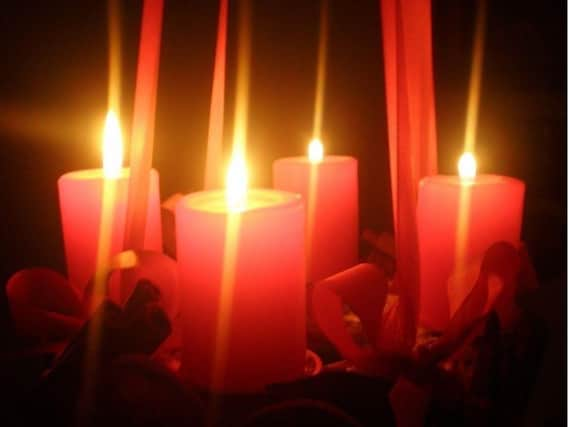Ian Ellis: Advent provides us with valuable time for spiritual reflection in the run-up to Christmas


The two really high points in the Christian year are, naturally, Christmas (the birth of Jesus, the incarnation) and Easter (the resurrection).
Before the celebration of these two high points, there are traditional periods of reflection, as ways of preparing for them.
Advertisement
Hide AdAdvertisement
Hide AdSo, before Easter come the weeks of Lent, a time of self-denial to aid reflection.


In the same way, before Christmas come the weeks of Advent, also intended for some serious, extra spiritual efforts.
This mood is signalled in the liturgical colour associated with Advent and Lent - purple.
By contrast, the colour associated with Christmas and Easter is white.
Advertisement
Hide AdAdvertisement
Hide AdYet the more inward-looking, self-examining aspect of Advent has been very much diluted by the ever-more frantic activities of the weeks before Christmas. There is so much to do. There is a "buzz” of happy busyness.
The German Lutherans first devised the Advent calendar as an aid to reflection on the significance of Mary and Joseph's journey to Bethlehem, but the idea has now been adapted and is often used with a purely commercial interest.
What is an earnest Christian to do, given this element of clash between the spiritual and the more worldly cultures in the run-up to Christmas?
Perhaps the best approach is to “rejoice with those who rejoice”, but at the same time not to neglect the deeper calls of the Advent time.
Advertisement
Hide AdAdvertisement
Hide AdOne of the traditional themes of Advent is, in fact, rather sombre: divine judgment. It can be a very sobering topic.
Yet the word "judgment” has different and even contrasting connotations.
It can evoke the actions of a judge, seated high up on his or her seat, sternly passing down a sentence for a crime.
Many people see the divine judgment in such a way, but it can also be seen more in terms of a weighing up of our lives by God.
Advertisement
Hide AdAdvertisement
Hide AdIndeed, a judge deliberates, taking all the relevant matters, both mitigating and exacerbating, into account.
In short, the choices we make in life and the actions we take actually matter. “Love thy neighbour” matters. The parable of the Good Samaritan certainly illustrates that.
These things are part of the Advent journey in heart and mind and soul.
But what about Christmas itself, the fast approaching climax of the Advent season?
Christmas Day is truly a happy day, and for many reasons.
Advertisement
Hide AdAdvertisement
Hide AdCentral to it all is the message of the incarnation, the teaching that in the infant Jesus, God has come to be one of us, to experience our life "first hand”.
For that reason, we can really think of him, and imagine him, as our companion and friend through life.
The word “salvation" carries the sense of healing – a “salve” is an ointment intended to aid the healing process - and that is what Christian people believe happens with the one who was born in Bethlehem. He is the saviour and healer of the world.
How this world needs healing. There is so much war and brutality, so much ill feeling, so much hunger and malnutrition, so much disease and suffering.
Advertisement
Hide AdAdvertisement
Hide AdThose who experience such hardships most may be perplexed by any idea of a loving God. Indeed, many people who are more observers of these things also question the fundamentals of faith because of what they see.
It is here that the Christmas story brings its special comfort, the message of the God who comes to humanity, and stretches out his arm to us, inviting us to place our hand in his and to find in that blessed companionship both strength and encouragement.
The babe of Bethlehem would grow up to be the man from Nazareth. He is also known as the “light of the world", an idea that certainly comes to life in our dark winter days.
The many lights that adorn our homes as well as villages, towns and cities in a way speak of that light of Christ and of his way.
There are many heroes in the nativity story.
Advertisement
Hide AdAdvertisement
Hide AdThe shepherds who respond to the message of the angel make their way in the middle of the night to the stable.
The magi from the East make an even longer journey to worship the new-born Christ.
There is another hero, perhaps not as prominent but nonetheless one who makes a vital decision - the inn keeper.
He does not simply tell Mary and Joseph that the inn is fully booked, that there are no vacancies, but he does his best for them. He sees their plight and he brings them to the warmth of the stable. It is all he has, but that act resounds with its compassion.
Advertisement
Hide AdAdvertisement
Hide AdEvery birth is an occasion of joy and hope, and the Christ-child's is certainly no different.
The joy and hope that the infant in the manger brings leads to a special wonder - the wonder at life itself, the wonder at our world despite its suffering, the wonder at our universe, the wonder at God who is beyond our human understanding but is not beyond our trust.
These days are to be received as a mid-winter gift of deep and joyful spiritual refreshment.
l Canon Ian Ellis is a former editor of The Church of Ireland Gazette.